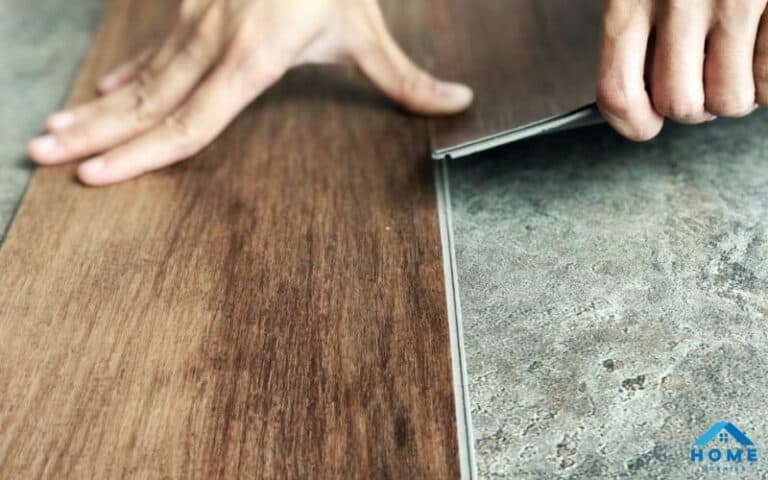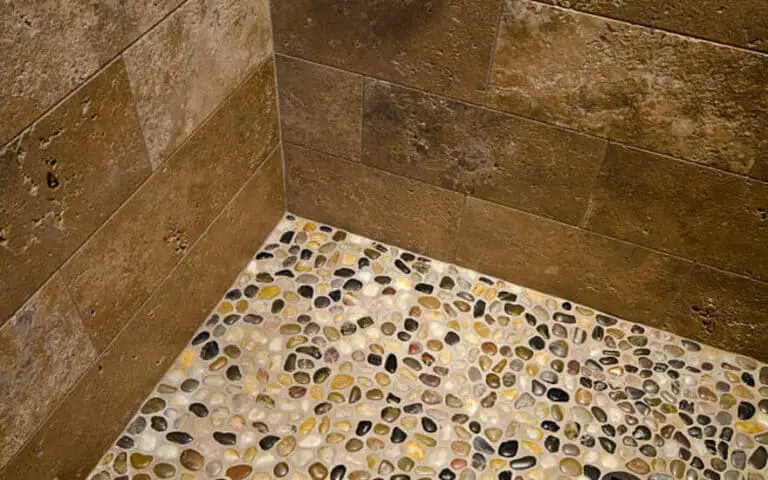Have you been considering hybrid flooring or laminate for your home renovation project? This blog post is for you! I’ll cover the differences between hybrid and laminate flooring, so you can decide which type is best for your home.

What is the difference between Hybrid and Laminate Flooring?
Hybrid and laminate flooring are both great options for the home. Hybrid flooring is softer on top and has a built-in underlay, while laminate flooring is composed of multiple layers of compressed wood with a printed decorative layer on top.
Hybrid flooring is made of multiple layers of vinyl and real wood, while laminate flooring tends to have a thinner coat which may scratch or indent more easily. The price of hybrid flooring is higher than traditional laminate planks, but it is worth the added cost.
1. The durability of Hybrid and Laminate Flooring
When it comes to durability, hybrid flooring is the clear winner. It is significantly more water-resistant than laminate flooring, making it less susceptible to warping and damage from water spills.
Hybrid flooring is slightly more scratch-resistant than laminate and stands up better to daily wear and tear. This makes it ideal for high-traffic areas or places with pets or children. In addition, hybrid planks are thicker than laminate, making them more stable and less likely to warp over time.
2. The appearance of Hybrid and Laminate Flooring
In terms of appearance, both hybrid and laminate flooring can look very similar. However, there are some key differences. Hybrid flooring has a softer top layer, making it feel more comfortable underfoot.
On the other hand, laminate flooring is harder and more rigid. As for colors and designs, hybrid and laminate flooring comes in various colors and styles. Laminate flooring has a wide selection of patterns, from wood-look to stone-look and more, while hybrid flooring has a narrower selection. Ultimately, the choice between hybrid and laminate will depend on the look you’re trying to achieve and the budget you have to work with.
3. Price Difference between Hybrid and Laminate Flooring
When it comes to the price of hybrid and laminate flooring, there is a clear difference. Depending on the kind and shade of flooring you choose, the price might vary widely, so it’s crucial to look around for the best bargain. In any case, hybrid flooring will provide superior value for money in the long run.
4. Maintenance Requirements for Hybrid and Laminate Flooring
When it comes to maintenance, both hybrid and laminate flooring are relatively low-maintenance. Both types of flooring require regular sweeping and mopping to keep them looking their best.
However, if you want to ensure your floors stay in excellent condition for years, you should immediately clean up any spills with a damp cloth. For hybrid flooring, you should avoid using harsh cleaning chemicals or scrubbing the surface too hard, as this can damage the protective layer. On the other hand, laminate flooring is more resilient to liquid spills and can be cleaned with mild detergent.
4 Advantages of Hybrid flooring
Regarding hybrid flooring, four main advantages make it a great choice for many homeowners. Durability, water resistance, easy installation, and cost-effectiveness are all reasons to consider hybrid flooring as an option for your home.
1. Durability
Hybrid floors and laminate floors are both very sturdy and long-lasting. Hybrid flooring is made from a combination of vinyl and laminate, so it has four layers, making it strong and durable.
On the other hand, laminate is predominantly wooed, so it can be more prone to scratches and chipping. However, it is considered more durable than hybrid flooring in higher-traffic areas.
2. Water-resistance
When it comes to water resistance, hybrid flooring is the clear winner. It is completely waterproof and has great stain-resistant properties. Laminate flooring does not have the same level of water resistance, as it can be damaged by water, and the wear layer can be easily scratched.
This makes hybrid flooring a great choice for areas where moisture is likely present, such as kitchens and bathrooms. It also makes it a great choice for busy households, as it can handle spills better than laminate flooring.
3. Easy installation
Regarding installation, hybrid flooring has a major advantage over laminate flooring. Hybrid flooring is a floating floor, so the planks interlock and rest on the subfloor, making installation much easier than traditional laminate flooring.
Additionally, hybrid flooring has no beveled edges, so you get a completely flush joint for a clean and professional look. So if you are looking for an easier and hassle-free installation, then hybrid flooring is the way to go.
4. Cost-effectiveness
Hybrid flooring is an excellent investment for your home. It is more durable and water-resistant than laminate, but it also offers cost-effectiveness—hybrid flooring comprises vinyl and laminate, so it’s cheaper than buying both separately.
Plus, it reduces installation costs as it can be installed quickly and easily. In addition, hybrid flooring requires less maintenance, which will help to keep costs down in the long run.
3 Advantages of Laminate Flooring
Laminate flooring is a great alternative to traditional hardwood flooring. It is durable, cost-effective, and easy to install and maintain. It is also available in various finishes, styles, and colors to suit any home décor. Laminate can withstand wear and tear, making it a suitable choice for busy households. It is also water-resistant, so it’s an ideal material for households with children or pets.
The installation process is straightforward and doesn’t require any specialized tools or skills. Finally, laminate flooring is cost-effective and can be installed quickly and affordably.
1. The durability of Laminate Flooring
Hybrid flooring is highly durable and waterproof, making it great for bathrooms and other wet areas. On the other hand, laminate flooring is also highly durable and can withstand high traffic, rowdy children, and pet claws.
Its top coating also makes it resistant to UV rays, meaning its color will last longer. But what makes laminate flooring stand out is its ability to resist water – something hybrid flooring can’t do independently.
2. Cost-Effectivee Solution
Laminate flooring is a cost-effective solution compared to hybrid flooring, as it is cheaper. It requires minimal maintenance, making it a great value for your money. Laminate is easy to install and doesn’t require specialized tools or expertise.
Laminate floors are also resistant to scratching, staining, and fading, so you won’t have to worry about replacing them for years to come.
3. Easy Installation and Maintenance
Regarding installation and maintenance, hybrid flooring offers a few advantages over laminate. Hybrid flooring is designed to be easy to install, with underlay already attached to the back of the planks.
This eliminates the need for separate underlayment and can help speed up the installation process. In addition, since hybrid flooring is 100% waterproof, it is much easier to clean than laminate flooring. Hybrid flooring requires minimal maintenance compared to hardwood or carpet, making it an ideal choice for busy households.
Summary
In conclusion, both hybrid and laminate flooring are excellent options for flooring, and both have their unique advantages and disadvantages. Hybrid flooring offers greater water resistance and durability and is easier to install, while laminate flooring is cost-effective and easy to install and maintain. Ultimately, choosing which flooring is best depends on your needs and preferences.






